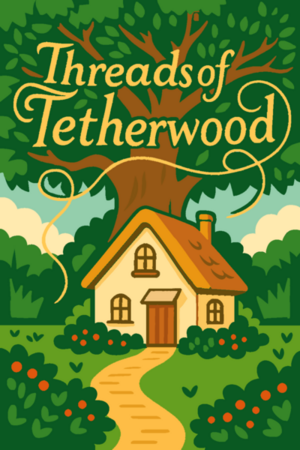Chapter 4:
Chapter 4: The Cloud-Herder’s Tunic
Threads of Tetherwood
By the time morning arrived, the rain had already begun.
Not a downpour—nothing so dramatic. It was more like a gentle weeping, the kind of rain that clung to the corners of windowpanes and left the world smelling of pine, wet stone, and old paper. A rain that seemed to carry secrets in its mist, whispering against the roof tiles and slipping into the bones of the day.
At the little table by the window, Lina stirred her tea, watching the spirals rise in the cup. The cloak at her shoulders stirred too, tugging lightly at her arm, like a child impatient to leave. It didn’t need words to remind her—it’s time.
Thimblewick was already waiting by the door. The mouse stood upright in his waistcoat, balancing a paper-wrapped parcel under one paw. A pair of brass-rimmed rain goggles perched precariously on his snout, their lenses catching glimmers of the pale morning light. His tail flicked once, a soundless metronome keeping its own measure of urgency.
“Well then,” he said, as though they were setting out on nothing more dangerous than a stroll through the market. “Ready for thunder?”
Lina rose reluctantly, fastening the cloak more snugly around her shoulders. “I haven’t even figured out backstitch,” she muttered, more to the teacup than to him.
“Perrin’s not picky,” Thimblewick replied, with the offhand certainty of someone who knew more than he would say. “But his clouds are.”
And with that, the door creaked open, and the soft weeping rain spilled into the threshold like an unspoken invitation.
🌧️
They followed a narrow footpath out of the village, the kind that seemed half-forgotten by boots and remembered only by roots. Whisper-willows lined the way, their branches sighing as the two passed beneath. Puddle-creatures—translucent little beings shaped like droplets with legs—blinked up at them from the roadside, rippling whenever a raindrop fell into their backs.
The path bent upward, climbing a moss-padded hill where the rain thickened—not harsher, just more insistent, as if the weather itself hadn’t quite decided whether to brood or bless.
Above, the sky rolled in slow, deliberate spirals, tufts of gray cloud moving like herds of great, woolly animals, grazing on unseen currents.
At the hill’s crown, a figure already waited. Perrin.
He stood rooted in the field, boots sunk deep in the wet grass. An old oilcloth jacket clung to his shoulders, patched in leaf-shaped stitches, while his hat—once a soup pot, by the look of it—sagged comfortably over his brow. Rain slid down him without claim, as though he were something the storm had long ago accepted.
His beard was long, its strands braided with yarn scraps and tiny curls of bell-lichen. His eyes, though soft, carried a weight like distant rivers—an ageless patience. He looked as if he had walked out of a bedtime story told not by grandmothers, but by the wind and the water themselves.
“Morning, Thimble,” he rumbled, his voice low and rolling, like thunder still thinking about whether to strike.
“And this,” said Thimblewick, adjusting the parcel beneath his arm, “is Lina. She’s the new tailor.”
Heat rose in Lina’s cheeks. She fiddled with the edge of her cloak. “Sort of,” she admitted.
Perrin studied her for a long, measuring moment, the kind that made the air between them feel very still. Finally, he gave a soft grunt—half approval, half acknowledgment. “Storm’s come early,” he said. “Perfect timing.”
“For what, exactly?” Lina asked.
Thimblewick handed over the parcel. Perrin unwrapped it carefully, revealing a sketch. A tunic, flowing and hooded, reinforced at the shoulders and cuffs as though meant to bear both weather and weight.
“Need a new coat,” Perrin explained. “Something light, but steady. Sky-fiber’s best, if you can handle it.”
Lina blinked. “I—uh. I don’t know what that is.”
“You’ll learn,” Perrin said, matter-of-factly, as if no further explanation were required. He turned, gesturing toward the swirling clouds overhead. “Come. Watch.”
⚡
The three of them moved farther into the open field, where the rain pooled in shallow dimples and clusters of sky-herbs shimmered faintly in the mist. Their stalks swayed without wind, their leaves reflecting pale blues and greens, as though they belonged more to the firmament than to the earth.
Perrin paused at the field’s center and lifted a slender rod from his belt—half shepherd’s crook, half tuning fork. He pressed the curved end into the soil, lifted his chin, and whistled a low, steady note.
The sound trembled through the air, and the sky answered.
The clouds shifted above them, spiraling down in slow, curious loops. They did not descend like storms, nor break apart like rainclouds—these moved like living things, sheep made of memory, coaxed toward the ground by sound alone.
One drifted close enough for Lina to study. It was softer than she’d imagined, frayed at the edges like a favorite scarf. Its underbelly flickered with the faintest threads of lightning, not striking, just pulsing—like a heartbeat caught in wool.
Perrin reached out, brushing his hand through the rain-fleece. He stroked it the way one might calm a restless horse, with a reverence that felt older than words.
“They carry grief, mostly,” he murmured, his voice almost lost to the mist. “Unspun sadness, unshed tears. You can’t force it out. You wait. Listen. When they’re ready to cry, they let go.”
Lina’s hand tightened on her cloak. “And then you collect the fiber?”
He nodded. “Only from clouds that have cried. Anything earlier, and the thread burns.”
So they waited.
Silence folded around them, thick and fragile. The clouds hovered, humming softly like old instruments tuning themselves. Then, at last, one of them began to tremble. It released a low, mournful tone, a sound that sank into Lina’s ribs. Raindrops spilled in a gentle rush, and the cloud wept freely across the hilltop.
Perrin knelt. From inside his jacket, he drew a woven net—its frame made of bark, its mesh of gold-thread fine enough to shimmer even in the dim light. He held it out beneath the falling rain.
And as the cloud shed its grief, fine silvery strands drifted down, lighter than breath, weightless as sorrow. They caught in the net, glistening like dew spun from moonlight.
Sky-fiber.
🪡
Back at the cottage, the world felt smaller again—safer, though the rain still wept softly against the windows. Lina sat at the worktable, a bundle of freshly dried sky-fiber glowing faintly in her lap. Its strands shimmered with emotion, grief woven into their very being, just as Perrin had said. When she gripped too tightly, the fiber twitched, recoiling as if in protest.
“It doesn’t like to be controlled,” Thimblewick remarked from his perch on the windowsill. His brass goggles hung around his neck now, lenses fogged with rain. “It remembers everything.”
Lina gave a humorless laugh, brushing a damp lock of hair from her cheek. “I know the feeling.”
Grumblebob, the little clanking automaton, waddled over with a polite whirr. It carried a spindle in its stubby arms, presenting it with a bow that made its gears creak. Lina took it and began to work, fingers awkward but determined.
At first, she moved carefully—spinning, winding, coaxing. But the sky-fiber fought her at every turn. The threads tangled around themselves. Some snarled into knots. One strand snapped with a hiss, sparking tiny bolts of lightning that stung her fingertips.
Lina groaned, throwing up her hands. “It doesn’t want to be stitched!”
“No,” Thimblewick corrected, his voice soft but firm, “it doesn’t want to be fixed.”
She blinked, caught by the weight of his words.
The mouse hopped closer, nudging the restless fiber with his paw. “Try listening to it. Let it keep what it needs. Let go of what you don’t.”
For a long moment, Lina sat still, her pulse loud in her ears. Then she picked up the fiber again—this time with less force, more patience. She listened.
She stopped trying to smooth every knot. She let the thread curl where it wanted. She allowed frays to remain, little storms woven into the cloth. Slowly, impossibly, the tunic began to take shape beneath her hands: cloud-gray, with storm-swirled cuffs that seemed to breathe, a cloaklet that shifted with the weather’s moods.
It wasn’t flawless. It wasn’t meant to be.
It didn’t hide the rain.
It honored it.
And in that quiet, rain-laced moment, Lina felt something shift inside her—like grief, finally exhaled into form.
☁️
When Lina returned to the hilltop the next day, Perrin was already waiting, his boots once again sunk into the grass. He accepted the finished tunic without a word, his rough hands turning the fabric over slowly, reverently.
Then he slid it on.
It fit.
Perrin flexed his arms, testing the shoulders, the weight of the cuffs. He closed his eyes, letting the rain settle against the cloth. “I can feel the rain,” he murmured. “But it doesn’t soak.”
Lina held her breath. “It remembers,” she said quietly. “Like you told me.”
His gaze softened, weathered eyes finding hers with a look that was less approval and more respect. “That’s rare,” he said. “Most folks rush to patch sadness away before it’s finished falling.”
Her smile came shyly, the kind that felt new. “I used to.”
For a moment, the rain hushed between them, a silence threaded with something unspoken. Then Perrin reached into the folds of the tunic and drew out a scrap of folded cloud-thread. It gleamed faintly, silver as moonlight on water.
“The fiber kept this for you,” he said, pressing it gently into her palm.
Lina unfolded it. Inside was a ribbon, silken and delicate. At its center, stitched so fine it seemed impossible, was a tiny emblem: her cloak’s own mark—a raindrop curled inside a cloud.
Her breath caught.
She pressed the ribbon to the back hem of her cloak. The thread accepted it at once, sinking in as if it had always belonged. A soft light flared. The mark shimmered and then glowed, a living symbol—of a rain cloud downpouring water in the ground.
The cloak tugged sharply to the left, pulling at her shoulder, then stilled.
“Another piece,” Thimblewick murmured, whiskers twitching.
“Of what?” Lina asked, her voice low, uncertain.
The mouse’s eyes glinted. “Of the purpose. You’ll see.”
Outside, the rain quickened, as if eager for what came next.
🧵
That night, after the rain had softened to a hush, Lina sat at the tailor’s desk with a single sheet of paper. The lantern beside her guttered low, casting long, thoughtful shadows across the room.
She wrote her first letter.
She didn’t know who it was for—herself, perhaps, or someone she hadn’t yet met. She didn’t know if it would reach anyone at all. There was no post between worlds, no courier bold enough to thread the distance.
But still, the words came. And still, it felt right.
When she finished, she folded the letter carefully and slid it into the desk’s top drawer. As it closed, the wood gave a quiet, decisive click—the sound of something filed away not under “Lost,” but under “Hope, Mildly Impossible.”
Lina leaned back, listening.
Outside, the sky rumbled like a satisfied yawn. The clouds above Tetherwood had cried their grief, and now they drifted lighter, brighter, their sorrow spun into rain and thread.
She realized, with a faint, steady warmth in her chest, that she was drifting lighter too.
🧵End of Chapter 4




Please sign in to leave a comment.